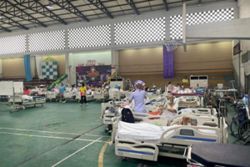KOTA KINABALU: While Sabahans struggle with rising living costs, low wages continue to hinder their ability to maintain a decent quality of life, a recent study on job seekers’ aspirations in the state reveals.
Conducted by the Department of Statistics Malaysia (DOSM), the study highlights a significant wage disparity that forces many skilled Sabahans to seek better opportunities outside the state while those with lower qualifications often remain, struggling to make ends meet.
Chief Statistician Datuk Sri Dr Mohd Uzir Mahidin said the study was conducted in response to concerns raised by Sabah State Labour Department director Wan Zulkifli Wan Setapa over Sabah’s high unemployment and poverty rates compared to other states in Malaysia.
"His concern reflects a genuine commitment to addressing Sabah’s socio-economic challenges and identifying the root causes of these issues. In response, the Institute of Labour Market Information and Analysis (ILMIA) was tasked with examining this phenomenon, leading to the Study on Job Seekers’ Aspirations in Sabah," he said.
The study involved 96.7% respondents from Sabah, with 71.1% residing in the state and 25.9% living in Peninsular Malaysia.
"The majority of respondents are from the West Coast of Sabah (64.8%) and choose to remain in the same area, while nearly half of the respondents from Sandakan (48.5%) and Tawau (45.6%) also stay in their respective regions," said Mohd Uzir.
According to the study, 72.2% of respondents have completed higher education, while 27.8% hold a secondary school certificate.
"The study also found that 87.6% of respondents with SPM or equivalent qualifications prefer to remain in Sabah, whereas only 54.4% of respondents with a bachelor's degree choose to stay in the state.
"Many graduates are leaving because salaries here do not match their qualifications. Most respondents, regardless of age, expressed willingness to move to other states in Malaysia if offered a salary between RM2,000 and RM4,999 per month, while the majority would consider migrating abroad for job offers exceeding RM5,000 per month," he said.
Speaking at the launch of the Study on the Aspirations of Job Seekers in Sabah, Mohd Uzir said the study also found that 66.2% of Sabahans working in Peninsular Malaysia prefer to continue their careers where they are.
He noted that despite job opportunities in Sabah, there remains a mismatch between job seekers’ academic qualifications or skills and the positions available.
"Respondents hope for more job opportunities with salaries that correspond to their educational levels and skills in Sabah," he added.
To address these challenges, the study proposes three key interventions:
Firstly, a labour market strategy is needed to harmonise labour supply and demand by leveraging accurate market data, investing in skills training, and ensuring that education programmes align with industry needs.
Secondly, strengthening key economic sectors such as agriculture, fisheries, tourism, and emerging fields like information and communication technology (ICT) is crucial to boosting competitiveness and productivity.
Finally, infrastructure improvements, particularly in rural areas, are necessary to expand access to job opportunities and training programmes, thereby stimulating economic growth across Sabah.
Mohd Uzir expressed optimism that with collaboration among various stakeholders, Sabah has the potential to develop a more sustainable and inclusive employment ecosystem, which could help reduce the unemployment rate and improve the well-being of its people.
However, he stressed that understanding the aspirations and challenges faced by job seekers is crucial to ensuring the effective implementation of intervention measures.
ILMIA, which has conducted several labour market studies, continues to play a crucial role in identifying employment trends and developing strategies to improve Malaysia’s workforce conditions.
"We are grateful to the respondents for sharing their experiences, hopes, and views. Their voices have been instrumental in helping us understand the real needs of the workforce and in formulating more inclusive policies," he said.









































